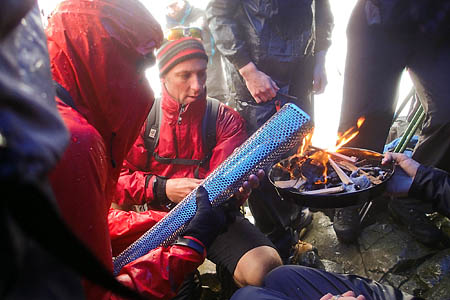Mountain rescuers and supporters helped light the Paralympic flame on top of England’s highest peak.
Members of the Wasdale Mountain Rescue Team accompanied four young Scout Association members and torchbearer Karl Hinett to the summit of Scafell Pike where a firelighting steel was used to create the spark for the torch.
Team chairman Richard Warren and fellow member Penny Kirby helped guide the party, along with Mark Ollis and Matthew LeVoi to the wind- and rain-swept 978m (3,209ft) summit.
Mr Hinett was badly burnt when his tank was attacked during the Iraq war. Police officers accompanied him and a media party to the peak where mountain rescuers used group shelters to improvise a cover under which the torch was lit.
The flame was then transferred to Davy lamps in which it was carried back down the mountain.
The ceremony was one of four taking place on the highest peak in each of the UK’s four nations: Ben Nevis, Snowdon, Slieve Donard and Scafell Pike.
Lord Coe made the journey to the top of Snowdon with Scouts for a similar ceremony.
Scouts were involved in each of the events, which marked the start of the run-up to the London 2012 Paralympic Games, which begin next Wednesday.
Scafell Pike was also the scene of an ascent by mountaineer Sir Chris Bonington and fellrunner Joss Naylor four years ago when the UK took over the Olympic baton from previous hosts China.
The Scafell Pike ceremony is described in a blog written by Mark Ollis.
